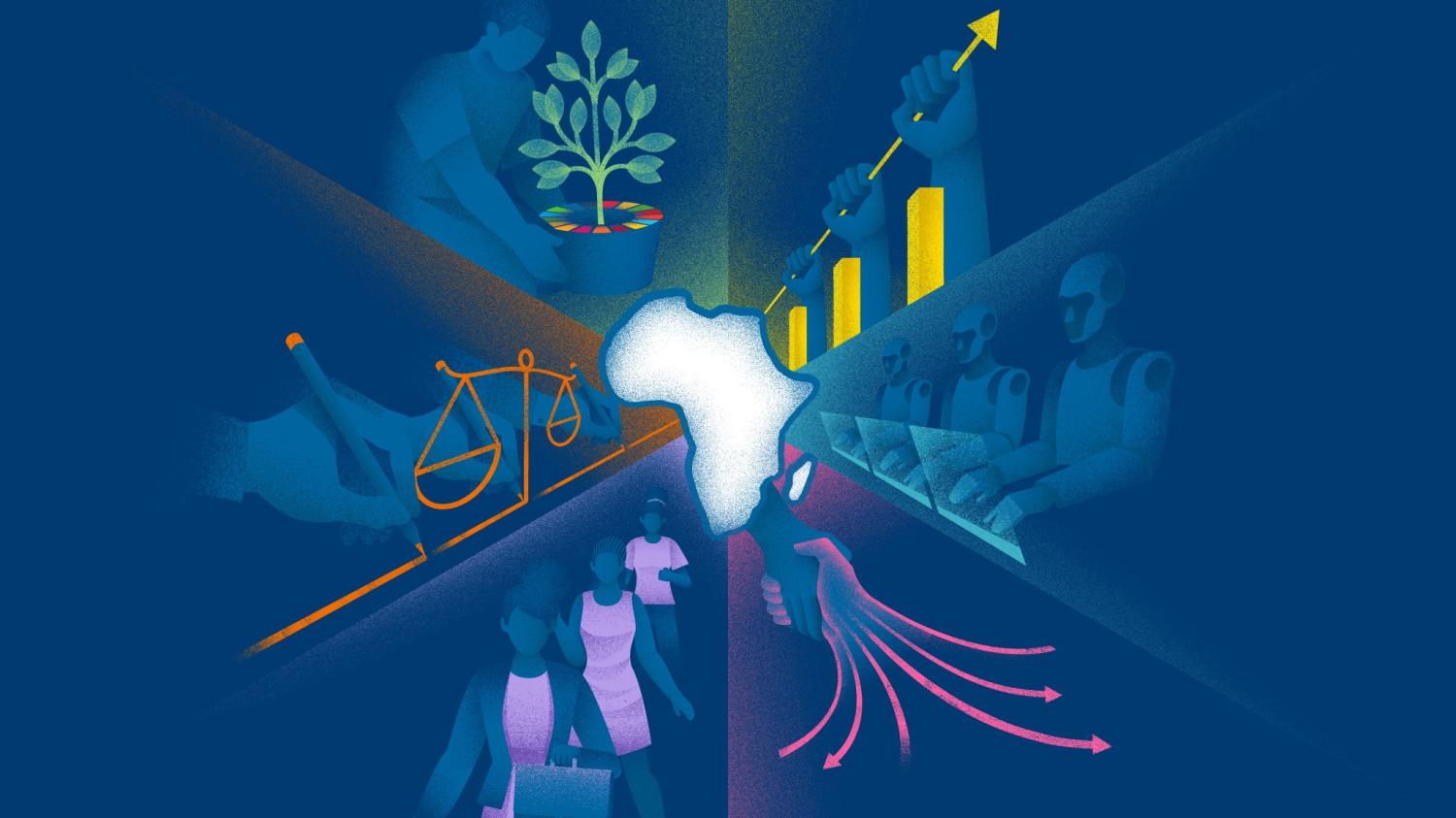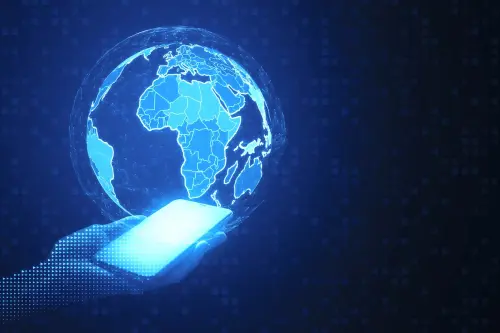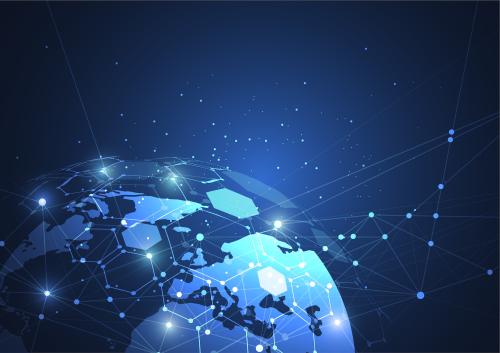This viewpoint is part of Chapter 5 of Foresight Africa 2025-2030, a report with cutting-edge insights and actionable strategies for Africa’s inclusive and sustainable development in the run-up to 2030. Read the full chapter on AI and emerging technologies.
By taking a strategic, inclusive approach, African countries can harness digital technologies to foster intelligent economies that are sustainable and transformative.
Digital technologies have significant potential to address many of Africa’s pressing challenges, but their adoption and impact face several obstacles that need to be overcome to ensure that nobody is left behind.
Technologies such as the Internet of Things and big data analytics have incredible potential to drive Africa’s economic growth, contributing up to $1.5 trillion in GDP by 2030 by increasing productivity and efficiency across industries,1 creating new jobs and business opportunities, especially for youth, and empowering citizens through increased access to information, thereby creating intelligent economies.2
By taking a strategic, inclusive approach, African countries can harness digital technologies to foster intelligent economies that are sustainable and transformative. However, African countries must address several key challenges related to digital inclusion for an intelligent economy to emerge.
Accelerating digital access
As of 2023, approximately 37% of the African population used the internet, with high costs of internet cited as the main barriers to usage, especially in low-income and rural areas.3 Notably, Africa’s fixed broadband access rates are the highest globally, averaging 14.8% of gross national income, far exceeding International Telecommunication Union’s recommended 2%.4 As a result, mobile connectivity is the primary means of accessing the internet in Africa. As of 2023, mobile penetration in sub-Saharan Africa was 44% and mobile internet penetration was 27%.5 Key barriers to mobile internet adoption include affordability (smartphones can cost up to 95% of monthly income for the poorest 20%),6 lack of digital skills, limited locally relevant content, and language barriers. Given that smartphone penetration is expected to reach 88% by 2030, mobile-based digital tech solutions may offer a practical way to tap into and expand digital technology capabilities in Africa.7
The most pressing issue, however, is access to electricity. Only about 43% of Africans have a reliable supply of electricity.8 Digital technologies significantly impact energy and electricity consumption, particularly through the rapid growth of data centers and increased computing demands. Generative AI systems already use around 33 times more energy to complete a task than task-specific software.9
Estimates suggest $400 billion is needed for electricity transmission and distribution improvements by 2050.10 Without this investment, most countries in the region will not have the necessary baseload electricity to benefit from digital technologies.
Addressing Africa’s digital infrastructure
Africa accounts for less than 1% of total available global data center capacity, despite being home to 18% of the world’s population.11 There are currently around 150 data centers across Africa, with most concentrated in South Africa, Nigeria, and Kenya. Analysts suggest that Africa needs at least 700 new data centers to meet its connectivity and data storage requirements over the medium term.12
Furthermore, the continent will need to make significant investments in high-performance supercomputers that can power deep learning models, train and run complex AI models efficiently, and analyze vast amounts of data quickly, all of which are essential for extracting meaningful insights from large datasets.
Africa currently has only a few supercomputers: “Toubkal” in Morocco—currently Africa’s most powerful supercomputer,13 “Lengau” in South Africa — the next fastest,14 and CHPC—also in South Africa.15 Given Africa’s size, population, and diverse needs, the continent needs multiple supercomputing centers strategically located in different regions to serve various countries, research communities, and entrepreneurs.
Mitigating risks and biases related to digital technologies through effective regulation
While regulation related to digital technologies in Africa is still in its early stages, there are growing efforts at both the national and continental levels to develop appropriate strategies and frameworks for ethical development of digital technologies. Still, many African countries lack robust regulatory frameworks and policies to address the ethical and societal implications, which can leave vulnerable populations exposed to potential harms and exploitation from uncontrolled AI deployment. Digital technologies have the potential to exacerbate existing inequalities and widen the digital divide. For example, AI systems are trained on historical data, which often reflect societal biases and inequalities, and, if not carefully designed and monitored, can perpetuate and amplify these biases leading to discriminatory outcomes.16
Africa’s path to developing an intelligent economy must focus on ensuring digital inclusion by addressing these challenges related to digital access, digital infrastructure, and robust regulatory reform. If successful, Africa has the potential to drive significant socioeconomic change and emerge as a key player in the global digital landscape.
-
Footnotes
- “Artificial Intelligence in African Economic Development Potential and Challenges to Overcome” (Addis Ababa: United Nations Economic Commission for Africa, 2024), https://repository.uneca.org/handle/10855/50180.
- An intelligent economy, also known as a smart economy, is an advanced economic model characterized by the integration of cutting-edge technologies, innovation, and sustainable practices to drive growth and improve societal well-being.
- “Measuring Digital Development: Facts and Figures 2023” (Geneva: ITU, 2023), https://www.itu.int/hub/publication/dind-ict_mdd-2023-1/.
- “Assessing the Progress of Internet Activity in Africa,” Telecom Review Africa (blog), April 18, 2024, https://www. telecomreviewafrica.com/articles/features/4206-assessing-the-progress-of-internet-activity-in-africa/.
- The Mobile Economy sub-Saharan Africa 2023” (London: GSMA, 2024), https://www.gsma.com/solutions-andimpact/connectivity-for-good/mobile-economy/sub-saharan-africa/.
- Matt Shanahan, “Despite Improvements, sub-Saharan Africa Has the Widest Usage and Coverage Gaps Worldwide,” Mobile for Development (blog), April 8, 2024, https://www.gsma.com/solutions-and-impact/connectivity-for-good/mobilefor-development/blog/despite-improvements-sub-saharan-africa-has-the-widest-usage-and-coverage-gaps-worldwide/.
- Eugénie Humeau and Tanvi Deshpande, “AI for Africa: Use Cases Delivering Impact” (London: GSMA, July 2024), https://www.gsma.com/solutions-and-impact/connectivity-for-good/mobile-for-development/wp-content/ uploads/2024/07/AI-for-Africa-Use-cases-delivering-impact.pdf.
- “Key Findings – Africa Energy Outlook 2022 – Analysis,” IEA, accessed December 16, 2024, https://www.iea.org/ reports/africa-energy-outlook-2022/key-findings.
- Eleni Kemene, Bart Valkhof, and Thapelo Tladi, “AI and Energy: Will AI Help Reduce Emissions or Increase Demand? Here’s What to Know,” World Economic Forum, July 22, 2024, https://www.weforum.org/stories/2024/07/generative-aienergy-emissions/.
- César Augier et al., “Green Energy in Africa Presents Significant Investment Opportunities” (McKinsey & Company, October 17, 2023), https://www.mckinsey.com/capabilities/sustainability/our-insights/green-energy-in-africapresents-significant-investment-opportunities.
- “Tackling a Critical Need for Data Center Infrastructure across Africa,” U.S. International Development Finance Corporation, accessed November 19, 2024, https://www.dfc.gov/investment-story/tackling-critical-need-data-centerinfrastructure-across-africa.
- Samuel Carvalhoay, “Data Centers – Just One Part of the African Digital Infrastructure Investment Equation,” Data Center Dynamics, June 4, 2024, https://www.datacenterdynamics.com/en/opinions/data-centers-just-one-part-of-theafrican-digital-infrastructure-investment-equation/.
- Wagdy Sawahel, “Africa Launches Powerful Supercomputer,” University World News, March 1, 2021, https://www. universityworldnews.com/post.php?story=20210228193908881.
- Admire Moyo, “SA Unleashes Africa’s Fastest Supercomputer” ITWeb News, June 8, 2016, https://www.itweb.co.za/ article/sa-unleashes-africas-fastest-supercomputer/Wdgp45Ma4KP7X9l8.
- “Advancing High-Performance Computing in South Africa: The CHPC,” NICIS, accessed December 16, 2024, https:// www.nicis.ac.za/chpc/.
- Nicol Turner Lee et al., “Algorithmic Bias Detection and Mitigation: Best Practices and Policies to Reduce Consumer Harms,” Brookings Institution, May 22, 2019, https://www.brookings.edu/articles/algorithmic-bias-detection-andmitigation-best-practices-and-policies-to-reduce-consumer-harms/.
The Brookings Institution is committed to quality, independence, and impact.
We are supported by a diverse array of funders. In line with our values and policies, each Brookings publication represents the sole views of its author(s).







Commentary
Accelerating digital inclusion in Africa
May 5, 2025